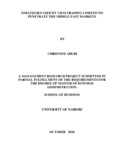| dc.description.abstract | Marketing products from less developed countries poses major challenges. Buyers in the interested foreign country are very careful as they perceive transport, currency quality and food safety issues key requirements for goods entering their country. Firms use various strategies to enter new foreign markets. These include offering superior products, modifications to existing products, security strategy geared to overcome transport risks, penetration price strategy, and conformity strategy.
The research design was a case study. An in-depth understanding of the global tea markets was required. Primary data was used in this study and was collected through interviews with senior managers at Chai Trading Limited. The interviews were guided by an interview guide which consisted of open ended questions. The study found that Chai Trading Limited has opened an office in Dubai.
The main objective of the Dubai office was to diversify business from the traditional markets of Pakistan and Sudan by having a presence in the untapped high potential markets in the Middle east and the Commonwealth Independent States. The office was also to facilitate demand for Kenya's tea abroad and also as a window to venture into tea value addition with a view of sustaining and growing business to profitability. The study revealed that the various challenges encountered include stiff competition from established players, business restrictions in some markets such as Iran, thin margins in the industry, foreign exchange fluctuations leading to forex loses and volatile political environments in some countries in the region.
The limitations of the study are that it only focused on penetration strategies in the Middle East. Africa still poses as a major untapped market for Kenyan tea. Currently the active markets in Africa for Kenyan tea are only Sudan and Egypt. It is quite ironical that Kenya produces the best quality tea in the world, while the untapped markets in Libya, Algeria Morrocco,West Africa, Central and Southern Africa import teas from Sri-Lanka,yet Kenya is the leading exporter of tea in the world.
Further study is required on tea consumption in African countries. The focus should be on the type of teas consumed, licensing, conformity requirements, and any government restrictions that could have hampered export of teas to this large market. An understanding is required on strategies used by Sri-Lanka and other key players who have dominated export of tea to Africa. | en_US |

